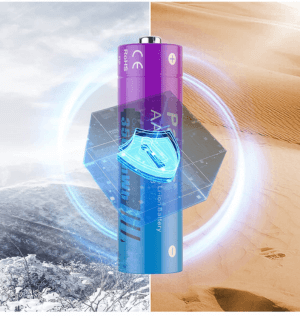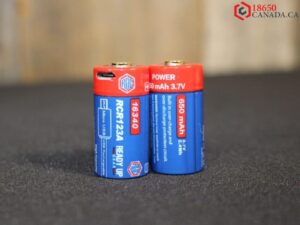In this article, we explore the significant role of lithium-ion batteries for consumer electronics. We discuss the definition and composition of lithium-ion batteries, highlighting their advantages such as high energy density, longer battery life, and fast-charging capabilities.
Patron electronics have become a crucial part of our everyday lives, revolutionizing the way we talk, work, and entertain ourselves. At the heart of these innovative devices lies the power of lithium-ion batteries, enabling their portability and functionality. In this article, we will explore the significant role of lithium-ion batteries in consumer electronics and the advancements that have propelled their potential.
The article covers advancements in lithium-ion battery technology, including increased energy density and enhanced battery life. It also addresses the consumer benefits of lithium-ion batteries, such as portability and powering high-performance devices.
Safety considerations, environmental impact, and future trends, including wearable devices and solid-state batteries, are discussed. The article concludes by emphasizing the importance of responsible battery usage and disposal.
Importance of Lithium-Ion Batteries in Consumer Electronics
Lithium-ion batteries have become the go-to choice for consumer electronics due to their exceptional performance and reliability. From smartphones and laptops to digital cameras and smartwatches, these batteries power our favorite gadgets, unleashing their true potential.
Overview of the Consumer Electronics Market
The consumer electronics market continues to thrive with constant advancements and evolving consumer demands. The need for compact, long-lasting, and efficient power sources has fueled the widespread adoption of lithium-ion batteries. This market segment presents immense opportunities for technological innovation and battery development.
Understanding Lithium-Ion Batteries
Definition and Composition of Lithium-Ion Batteries
Lithium-ion batteries are rechargeable energy storage devices that utilize lithium ions as the primary means of energy transfer. They consist of one or extra cells, each containing a tremendous electrode (cathode), a negative electrode (anode), and an electrolyte answer. The electrodes are typically made of materials like lithium cobalt oxide or lithium iron phosphate.
Advantages of Lithium-Ion Batteries For Consumer Electronics
Lithium-ion batteries offer several advantages that make them ideal for consumer electronics. They have a high energy density, allowing them to store more energy in a compact size. This enables sleek and portable designs for smartphones, tablets, and wearable devices. Moreover, lithium-ion batteries have a low self-discharge rate, meaning they retain their charge for longer periods, providing convenience for users.

Common Applications of Lithium-Ion Batteries in Consumer Electronics
Lithium-ion batteries find applications in a wide range of consumer electronics, including smartphones, laptops, tablets, digital cameras, e-readers, portable gaming devices, and smartwatches. These batteries provide the necessary power to support the functionalities and performance of these devices, ensuring seamless user experiences.
Advancements in Lithium-ion Battery Technology
Increase in Energy Density
Continuous research and development efforts have led to significant advancements in lithium-ion battery technology. One key area of focus has been increasing the energy density of batteries, allowing for longer battery life and improved performance. Scientists and engineers are exploring various approaches, such as the use of advanced electrode materials and novel cell designs, to achieve higher energy densities.
Enhanced Battery Life
Battery life is a crucial factor for consumer electronics, as users expect devices to last throughout the day without constant recharging. Advances in lithium-ion battery chemistry and management systems have led to longer-lasting batteries that can meet the demands of power-hungry applications. These advancements have significantly improved the user experience, reducing the need for frequent charging.
Development of Fast-Charging Technologies
In today’s fast-paced world, consumers expect quick charging solutions that minimize downtime. To address this demand, manufacturers have been investing in the development of fast-charging technologies for lithium-ion batteries. High-power chargers, advanced charging algorithms, and improved thermal management systems have emerged, enabling rapid charging while maintaining safety and battery longevity.
Consumer Benefits and Impact
Portability and Convenience
Lithium-ion batteries have revolutionized consumer electronics by enabling portability and convenience. The lightweight and compact nature of these batteries has made it possible to create sleek and slim devices that can be easily carried and used on the go. Whether it’s a smartphone in our pocket or a laptop in our backpack, lithium-ion batteries have transformed the way we interact with technology.
Powering High-Performance Devices
Consumer electronics have become increasingly powerful, offering advanced features and capabilities. Lithium-ion batteries provide the necessary power to support these high-performance devices, ensuring smooth multitasking, seamless multimedia playback, and extended usage times. From demanding applications to resource-intensive gaming, lithium-ion batteries deliver the energy required to meet the growing demands of consumers.
Environmental Impact and Sustainability Considerations
As the popularity of consumer electronics grows, so does the concern for their environmental impact. Lithium-ion batteries offer advantages in terms of energy efficiency and lower carbon footprint compared to conventional disposable batteries. However, it is essential to promote responsible recycling and disposal practices to mitigate the environmental consequences of battery waste.
Safety Considerations and Regulations
Battery Safety Standards
Safety is of utmost importance when it comes to consumer electronics, and lithium-ion battery manufacturers adhere to strict safety standards. International organizations and regulatory bodies establish guidelines to ensure the safe design, manufacturing, and use of lithium-ion batteries. Compliance with these standards helps mitigate risks associated with battery malfunction, overheating, and explosion.
Preventing Overheating and Explosion Risks
Although rare, incidents involving battery overheating and explosions have garnered attention. Manufacturers employ various safety measures such as thermal management systems, advanced battery monitoring, and protection circuits to prevent such risks. Research and development efforts continue to focus on enhancing battery safety to address any potential concerns.
Government Regulations and Industry Initiatives
Governments and industry stakeholders are actively involved in setting regulations and implementing initiatives to ensure the safety and reliability of lithium-ion batteries. These measures include certification programs, quality control procedures, and collaborations with consumer electronics manufacturers to uphold safety standards. Additionally, public awareness campaigns promote responsible battery usage and disposal practices.
Future Trends and Innovations
Integration of Lithium-Ion Batteries in Wearable Devices
The rise of wearable technology has opened up new opportunities for lithium-ion batteries. From fitness trackers to smartwatches, these devices require compact and lightweight power sources. Researchers are exploring flexible and stretchable lithium-ion batteries to cater to the unique form factors of wearable devices, enabling seamless integration and enhancing user comfort.
LISHEN 21700-LR2170SD 9.6A Battery for Consumer Electronics
When it comes to unleashing the potential of lithium-ion batteries in consumer electronics, the LISHEN 21700-LR2170SD 9.6A battery proves to be a game-changer. With its impressive power output and reliability, this battery takes consumer electronics to new heights.
From smartphones and laptops to portable gaming devices and wearable tech, the LISHEN 21700-LR2170SD 9.6A battery delivers exceptional performance and extended usage time. Its high capacity and discharge rate ensure a seamless experience, allowing users to enjoy their devices for longer periods without interruptions.
Say goodbye to frequent recharging and welcome a new level of convenience and efficiency with the LISHEN 21700-LR2170SD 9.6A battery, maximizing the potential of your favorite consumer electronics.
Exploration of Solid-State Batteries
Solid-state batteries represent a promising avenue for future battery technology. Those batteries replace the liquid electrolyte determined in traditional lithium-ion batteries with a solid-state electrolyte. Solid-state batteries offer advantages such as higher energy density, improved safety, and increased lifespan. Continued research and development in this area may revolutionize the consumer electronics market, unlocking new possibilities for power storage.
Advancements in Wireless Charging Technology
Wireless charging has gained popularity as a convenient and cable-free method of charging consumer electronics. Lithium-ion batteries can be wirelessly charged using induction or resonance technologies. Ongoing research focuses on improving the efficiency and range of wireless charging, making it even more accessible and seamless for consumers.
Termination
Lithium-ion batteries have transformed the consumer electronics landscape, powering our devices and enabling the digital lifestyle we enjoy today. With ongoing advancements in technology, these batteries continue to unleash the potential of consumer electronics, offering enhanced performance, longer battery life, and improved safety. As we move forward, it is crucial to prioritize sustainability, promote responsible battery usage, and explore innovative alternatives to ensure a greener and more efficient future.
FAQs
How Long Do Lithium-Ion Batteries Typically Last in Consumer Electronics?
The lifespan of lithium-ion batteries in consumer electronics varies depending on usage patterns, device configurations, and other factors. On average, these batteries can last between 2 to 5 years before experiencing noticeable degradation in performance.
Are There Any Limitations to the Use of Lithium-Ion Batteries in Consumer Electronics?
While lithium-ion batteries offer many benefits, they do have limitations. These include a finite lifespan, susceptibility to damage from high temperatures, and the need for proper recycling to minimize environmental impact.
Can Lithium-Ion Batteries Be Replaced or Upgraded in Consumer Devices?
In some cases, lithium-ion batteries in consumer devices can be replaced or upgraded. However, this depends on the device’s design and the availability of compatible batteries. It is recommended to consult the device manufacturer or authorized service centers for battery replacement or upgrade options.
Are There Any Alternatives to Lithium-Ion Batteries for Consumer Electronics?
While lithium-ion batteries are widely used, research is ongoing to explore alternative battery technologies such as solid-state batteries and hydrogen fuel cells. These technologies have the potential to offer improved performance, increased energy density, and enhanced safety.
How Can Consumers Ensure the Safe and Proper Disposal of Lithium-Ion Batteries?
To ensure the safe and proper disposal of lithium-ion batteries, consumers should follow local regulations and guidelines. Many electronics retailers and recycling centers offer battery recycling programs. It is essential to recycle lithium-ion batteries to minimize environmental impact and prevent potential hazards.

